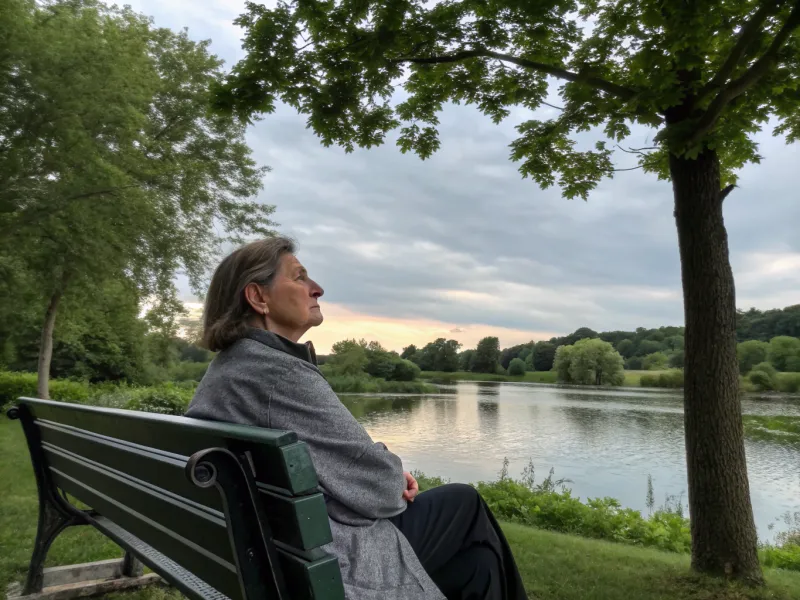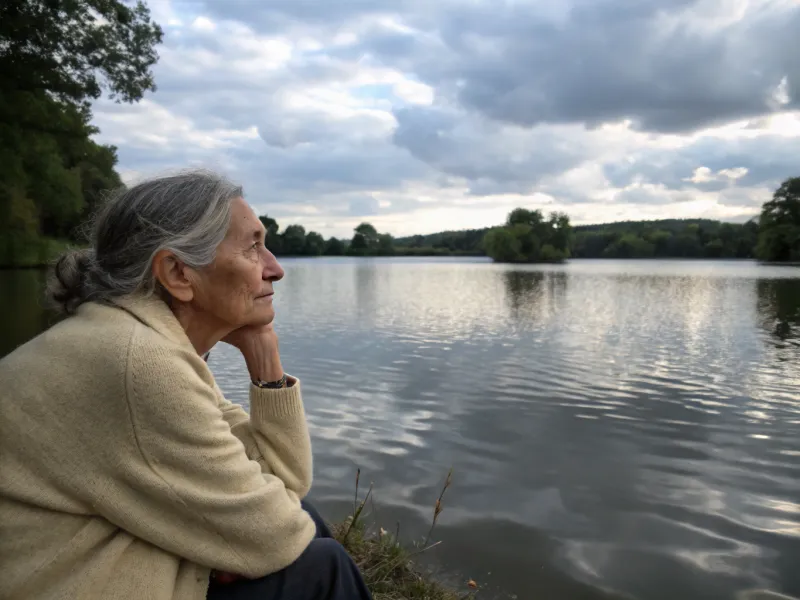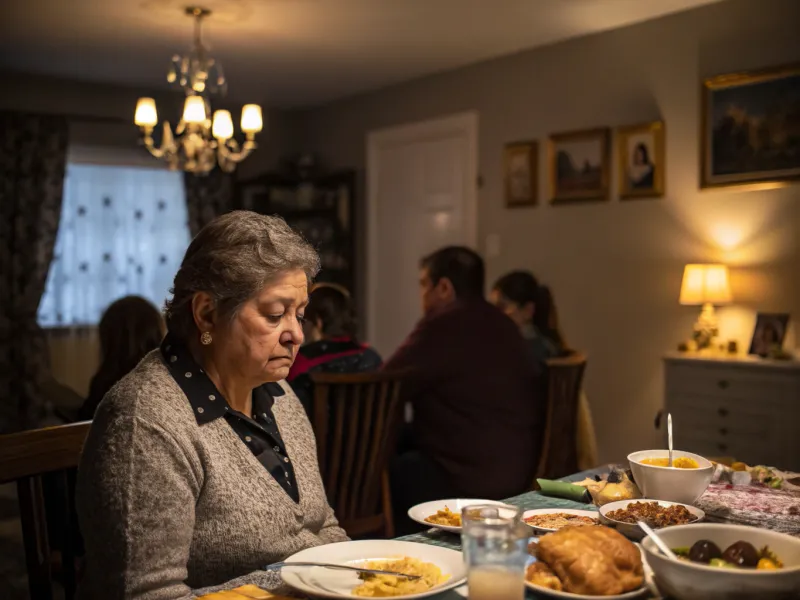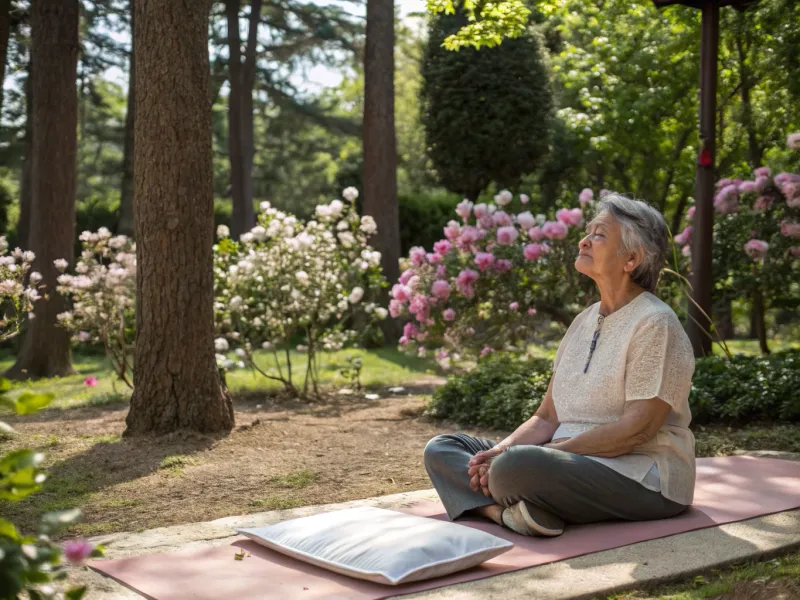30 motivi per cui le donne over 60 stanno finalmente scegliendo se stesse rispetto ai matrimoni a lungo termine
For decades, you might have believed that enduring a long-term marriage past the age of 60 was simply part of life’s design. But recently, a powerful shift has emerged, challenging the age-old narrative that older women remain tethered to their marriages no matter the circumstance.
In a world where freedom and fulfillment are taking precedence, it’s essential to understand what truly drives women to make such life-altering decisions.
Here, I’ll walk you through the transformative triggers that encourage seasoned women to embrace change, break away, and seek the happiness they deserve.
1. Deriva emotiva silenziosa

Years pass, and what once felt like a deep emotional bond gradually fades into the background. You might wake up one morning and realize that conversations once filled with warmth now feel like empty exchanges. It’s not the absence of words but the perdita di una connessione autentica. Quando è stata l'ultima volta che vi siete sentiti veramente compresi?
Perhaps you’ve noticed the vacant look in your partner’s eyes as you speak, the creeping sensation that your presence is overlooked. Feeling unseen can be just as painful as being ignored. Emotional distance isn’t always marked by fights or harsh words—it often unfolds in hushed moments, barely noticeable until it’s undeniable.
Reclaiming your voice isn’t about speaking louder but about ensuring your words hold weight. It starts with rediscovering what makes you feel valued and acknowledging that you are worthy of being heard. Walking away isn’t merely an exit—it’s a step toward self-empowerment and renewal.
2. Aspirazioni non realizzate

Once, your heart brimmed with ambitions—places you longed to visit, passions you hoped to pursue, knowledge you were eager to acquire. Over time, those aspirations may have been set aside, tucked away in favor of responsibilities and routines. But what happens when you realize that time waits for no one?
Forse una volta avete immaginato di imparare una nuova abilità, di scrivere un libro o semplicemente di esplorare territori inesplorati. Tuttavia, le esigenze del matrimonio e della vita quotidiana hanno spinto quei sogni sempre più in là. Alla fine, arriva un momento in cui riconoscete che l'attesa deve finire.
Embracing your unfulfilled aspirations is not about forsaking commitments but about honoring your own desires. Taking charge of your future can be exhilarating—allowing yourself the freedom to chase long-lost passions can reignite the spirit within. Sometimes, stepping away is the only way to finally step into the life you were meant to live.
3. Discrepanze finanziarie

Money often operates silently in a relationship—until the moment it becomes impossible to ignore. Discovering hidden debts, reckless spending, or a complete disregard for shared financial goals can fracture the foundation of trust.
Tensione finanziaria isn’t just about dollar signs; it’s about honesty, transparency, and mutual responsibility. When deception seeps into financial matters, it can leave you feeling blindsided, like a silent partner in a contract you never agreed to.
Regaining control of your financial future is empowering. Taking charge of your resources and ensuring financial independence is not about material security alone—it’s about reclaiming your peace of mind. Walking away can be the first step toward stability, autonomy, and a future where your financial well-being is no longer compromised.
4. Crescita personale soffocata

Personal evolution is inevitable, yet some relationships fail to grow alongside us. You might come to the realization that your marriage, once a space of shared growth, now feels like a constraint—a place where you’ve been standing still rather than flourishing.
It’s not necessarily about blame but about acknowledging that your journey requires more room to expand. If your marriage stifles curiosity, exploration, or self-improvement, it may begin to feel suffocating—like a bird confined in a too-small cage.
Pursuing your personal growth isn’t about abandoning love but about honoring the need for self-discovery. Whether it’s through new experiences, education, or creative pursuits, allowing yourself to grow freely can be liberating. Walking away might be the key to uncovering who you were always meant to become.
5. Perdita di intimità

True intimacy extends far beyond the physical—it’s the deep emotional connection that turns companionship into something more profound. But what if that closeness disappears, leaving only the shell of a relationship behind?
Potreste ritrovarvi a desiderare il calore e la tenerezza che un tempo definivano la vostra unione. Con il tempo, la distanza può insediarsi come un ospite indesiderato, facendo sentire estranei anche i tocchi più familiari. Quando l'intimità svanisce, spesso porta con sé il senso di appartenenza e di affetto.
Recognizing the need for emotional and physical fulfillment is not selfish—it’s essential. Seeking connection elsewhere, whether through rediscovering passion within or forging new bonds, is an act of self-care. Walking away can lead to a life where intimacy isn’t a memory of the past but a reality in the present.
6. Mancanza di rispetto cronica

Il rispetto è la pietra angolare di ogni relazione duratura. Quando si sgretola, ciò che rimane è spesso risentimento, stanchezza e un'insopportabile sensazione di essere sminuiti.
Perhaps you’ve endured years of belittling remarks, dismissive gestures, or outright disregard for your feelings. It’s easy to minimize these moments, to chalk them up to personality quirks or temporary frustration. But the truth is, constant disrespect chips away at self-worth.
Choosing to walk away isn’t about demanding admiration—it’s about insisting on dignity. You deserve to be in a space where mutual appreciation thrives. Leaving behind a relationship lacking in respect isn’t a loss; it’s a declaration of self-value.
7. Infedeltà e fiducia infranta

Infidelity is more than just a breach of vows—it’s a fracture in the very foundation of trust. The realization that a partner has been unfaithful can send shockwaves through every aspect of your life, leaving you questioning everything you once believed to be true.
Il dolore del tradimento brings forth an avalanche of emotions: anger, disbelief, sadness, and self-doubt. Rebuilding trust, if even possible, is an uphill battle that not everyone is willing—or able—to fight.
Healing begins with recognizing that trust, once broken, may never fully mend. Walking away is not just about escaping pain but about reclaiming peace. It’s about choosing a future where honesty and fidelity are not just expectations but realities.
8. Bisogni sanitari trascurati

Health is one of the most precious assets we have, yet it’s often sacrificed in service of others. If you’ve found yourself neglecting your physical or mental well-being while prioritizing your partner’s needs, it may be time for a wake-up call.
Ignoring your health isn’t just about skipping doctor’s appointments—it’s about suppressing your own needs in a relationship that doesn’t reciprocate care. The emotional toll of being overlooked can be just as damaging as any physical ailment.
Prioritizing yourself is not selfish—it’s survival. Walking away may be the necessary step toward reclaiming your health and ensuring that you are cared for in the way you deserve.
9. Realizzazione dell'incompatibilità

Nel corso del tempo, potreste rendervi conto che la persona con cui vi sentivate completamente in sintonia è ora irriconoscibile. Le strade che un tempo erano allineate si sono separate, lasciandovi entrambi a percorrere strade diverse.
People grow, change, and develop new perspectives. What once felt like a shared vision may now seem like a distant memory. This recognition isn’t about regret—it’s about accepting that not all relationships are meant to last a lifetime.
Letting go of a partnership that no longer serves either person can be a difficult but necessary decision. Walking away creates the opportunity for both individuals to seek fulfillment in ways that truly resonate with who they’ve become.
10. Desiderio di indipendenza

Il desiderio di indipendenza spesso emerge più forte con il tempo. Il desiderio di autonomia, di libertà di plasmare ogni giorno senza aspettative esterne, può diventare impossibile da ignorare.
Choosing independence is not a rejection of companionship but a pursuit of personal fulfillment. It’s about embracing the ability to navigate life on your own terms.
Stepping away is not about isolation—it’s about empowerment. It’s the choice to design a future that aligns with your needs, dreams, and ambitions.
11. Mancanza di avventura

L'avventura è il cuore pulsante di una vita vivace, ma può svanire silenziosamente nella monotonia della routine quotidiana. Potreste svegliarvi un giorno e rendervi conto che il brivido della spontaneità, un tempo parte integrante della vostra relazione, è diminuito fino a diventare solo prevedibile.
It’s not about chasing endless excitement but about feeling the pulse of possibility. The absence of adventure can leave you longing for experiences that ignite your curiosity and challenge your comfort zone.
Reclaiming your adventurous spirit means welcoming the unknown with open arms. Whether it’s traveling, exploring new interests, or embracing change, saying yes to life can be exhilarating. Sometimes, walking away is the first step toward rediscovering the excitement that once set your soul alight.
12. Esaurimento emotivo

Emotional exhaustion doesn’t happen overnight—it accumulates slowly, draining your energy until even simple interactions feel overwhelming. You may find yourself feeling emotionally spent, struggling to give to a relationship that offers little in return.
Il peso di portare fardelli emotivi senza essere ricambiati può essere soffocante.. It’s not about a lack of love, but about feeling utterly depleted, with no reserves left to nurture the connection.
Restoring your emotional well-being starts with self-preservation. It’s about recognizing when giving too much has left you empty and understanding that prioritizing yourself isn’t selfish—it’s essential. Walking away might be the only way to refill your cup and regain the emotional strength you deserve.
13. Cambiare i valori personali

La crescita è inevitabile e, con il passare degli anni, le vostre convinzioni e priorità possono cambiare in modi che non avevate previsto. Potreste svegliarvi con la consapevolezza che i valori che un tempo condividevate con il vostro partner non sono più in linea, creando un divario sempre più ampio tra di voi.
This divergence isn’t about fault but about authenticity. Living a life that contradicts your deeply held beliefs can be unsettling, leading to feelings of disconnection and compromise.
Onorare i propri valori in evoluzione significa abbracciare chi si è oggi, non aggrapparsi a una versione passata di se stessi. A volte, separarsi è la scelta più onesta e coraggiosa, che permette a entrambi i partner di trovare soddisfazione in relazioni che riflettono il loro vero io.
14. Mancanza di supporto

Support is the foundation of any strong partnership, yet you might find yourself standing alone when you need it most. Whether it’s emotional encouragement, understanding, or simple acts of kindness, the absence of support can feel isolating.
Loneliness within a relationship can be more painful than solitude. It’s not about needing constant reassurance but about knowing you have a partner who truly stands beside you.
Recognizing this void is the first step toward seeking the support you deserve. Walking away may open the door to deeper connections—ones where you’re surrounded by people who uplift and stand with you, no matter the storm.
15. Conflitti irrisolti

Ogni relazione deve affrontare dei disaccordi, ma quando i conflitti rimangono irrisolti, diventano ferite che non guariscono mai. Potreste sentirvi intrappolati in un ciclo ripetitivo di discussioni che non vanno da nessuna parte, lasciando che la frustrazione si incancrenisca sotto la superficie.
The exhaustion of reliving the same disputes over and over can wear down even the strongest bonds. It’s not just about differing opinions—it’s about feeling unheard, misunderstood, and stuck in a loop of discord.
La vera risoluzione richiede uno sforzo da parte di entrambi i partner. When that effort isn’t mutual, it may be time to step away. Lasciarsi alle spalle i conflitti irrisolti può essere la chiave per recuperare la pace e creare un futuro privo di risentimenti.
16. Stagnazione e routine

Se da un lato le routine offrono stabilità, dall'altro possono diventare gabbie che limitano la crescita e l'eccitazione. Potreste rendervi conto che la vostra vita è diventata un ciclo monotono, privo della passione e dell'energia di un tempo.
Stagnation can feel like an invisible weight, holding you back from experiences that could bring joy and inspiration. It’s not about discarding everything familiar, but about inviting change into your life.
Breaking free from routine doesn’t mean abandoning comfort—it means choosing fulfillment over complacency. Walking away might be the catalyst that propels you toward a life that feels alive, dynamic, and full of possibility.
17. Mancanza di obiettivi condivisi

Shared goals are the glue that binds a partnership, yet over time, those ambitions can shift in opposite directions. You may wake up to the realization that the future you envision no longer aligns with your partner’s path.
The recognition that you’ve outgrown a shared dream can be both painful and liberating. It’s not about assigning blame but about accepting that growth sometimes means walking separate roads.
Reevaluating your aspirations is essential. Choosing to follow your own path doesn’t mean abandoning love—it means prioritizing personal fulfillment. Walking away can allow both of you to chase the futures that truly resonate with your evolving selves.
18. Tradimento emotivo

Betrayal isn’t always physical—sometimes, the deepest wounds come from knowing your partner has turned to someone else for emotional intimacy. Discovering that they have shared their deepest thoughts, fears, or affections with another can feel like a profound act of disloyalty.
This kind of betrayal stings in a way that words cannot fully capture. It’s not about possessiveness but about trust being fractured at its very core.
La guarigione da un tradimento emotivo richiede chiarezza, limiti e rispetto di sé. Allontanarsi può essere un modo per recuperare il proprio benessere emotivo, assicurandosi che la fiducia data sia apprezzata e protetta.
19. Realizzazione dell'autostima

Realizing your self-worth can be a pivotal moment that changes everything. You might suddenly see that you’ve spent years settling for less than you deserve, tolerating treatment that undermines your value.
This awakening isn’t about arrogance—it’s about self-respect. Understanding your worth means refusing to accept neglect, indifference, or mistreatment.
Scegliere se stessi non è un atto di egoismo, ma di responsabilizzazione. Allontanarsi potrebbe essere il passo più potente che potete intraprendere per una vita in cui siete amati, rispettati e apprezzati per ciò che siete veramente.
20. Il bisogno di pace

Con il passare degli anni, il desiderio di pace diventa spesso più profondo. Ci si scopre stanchi della tensione e si desidera una vita in cui la calma e l'appagamento abbiano la precedenza sul conflitto e sullo stress.
Seeking peace isn’t about running from difficulty but about choosing an environment that nurtures your well-being. Chaos, whether emotional or situational, can become too heavy a burden to carry.
Prioritizing tranquility means making decisions that foster harmony within. Walking away may be the path to the serenity you’ve been yearning for—a space where peace isn’t just an occasional moment but a way of life.
21. Sentirsi presi per i fondelli

L'essere dati per scontati avviene gradualmente, con l'erosione costante dell'apprezzamento nel tempo. Dare di più, fare di più, ma ricevere poco in cambio può lasciare un persistente senso di invisibilità.
Becoming a supporting character in your own story is a stark realization. It’s not about seeking constant praise but about knowing your presence and efforts matter.
Reclaiming visibility starts with demanding recognition, ensuring that contributions don’t go unnoticed. Walking away may be the defining step toward relationships where value and appreciation are never in question.
22. Sentirsi non apprezzati

Appreciation is a simple yet powerful force—one that can breathe life into even the most ordinary moments. Without it, daily contributions and acts of kindness can feel like whispers lost in the wind.
The absence of gratitude creates an emotional void, leaving behind a sense of being unseen and uncelebrated. It’s not about expecting grand gestures, but about feeling acknowledged.
La valorizzazione di se stessi inizia con il riconoscimento del proprio valore, indipendentemente dalla convalida esterna. Allontanarsi può essere la scelta necessaria per trovare spazi in cui l'apprezzamento fluisce liberamente e la presenza è veramente apprezzata.
23. Perseguire la realizzazione personale

La realizzazione personale è un viaggio in continua evoluzione, una ricerca per coltivare la gioia, lo scopo e la soddisfazione. Quando la vita sembra stagnante, la fame di qualcosa di più diventa innegabile.
This longing isn’t about disregarding obligations but about creating balance—one that nurtures the soul rather than depletes it. Suppressing passions and desires for the sake of stability can lead to a quiet kind of despair.
L'abbraccio con l'appagamento richiede audacia, un'apertura a esplorare interessi che si allineano con il vero scopo. Allontanarsi potrebbe essere il primo passo verso una vita in cui ogni giorno è ricco di significato e possibilità.
24. Lutto irrisolto

Il dolore persiste come una presenza non dichiaratae che modellano le emozioni in modi che gli altri non sempre riescono a comprendere. Affrontare una perdita da soli, senza il sostegno del partner, può essere un'esperienza isolante.
La mancanza di empatia o di spazio per elaborare le emozioni può creare un abisso emotivo, facendo sentire il dolore ancora più pesante. La guarigione richiede il riconoscimento, non l'evitamento, e il dolore merita di essere accolto, non respinto.
Navigare nella perdita significa trovare spazi in cui le emozioni vengono accolte con compassione. Allontanarsi potrebbe essere il passo verso un ambiente in cui il lutto viene onorato, rispettato e si dà spazio alla guarigione.
25. Risveglio spirituale

La crescita spirituale è profondamente personale e spesso porta a cambiamenti di prospettiva, valori e convinzioni. La consapevolezza che una relazione non supporta più questo percorso può essere un momento sconvolgente ma chiarificatore.
When spiritual paths diverge, the disconnect can become undeniable. It’s not about changing another person but about honoring personal truth. Feeling stifled in spiritual exploration can lead to an internal struggle, where self-discovery is held back by expectation.
Scegliere l'autenticità al posto del conformismo è un atto di rispetto verso se stessi. Allontanarsi può essere la strada per abbracciare un viaggio di connessione più profondo, che si allinei pienamente con il sé in evoluzione.
26. Desiderio di connessione autentica

True connection is more than just presence—it’s about being seen, heard, and understood on a deeper level. Surface-level interactions and emotional distance can leave a profound sense of loneliness, even in the closest of relationships.
Craving meaningful engagement isn’t about dissatisfaction; it’s about seeking relationships that nourish the heart and mind. When emotional depth is missing, the gap only widens over time.
Aprire la porta a una connessione autentica richiede vulnerabilità e la volontà di cercare coloro che risuonano veramente. Allontanarsi può essere il passo necessario verso relazioni che offrono la profondità e l'intimità che rendono la vita più ricca.
27. L'invito all'espressione di sé

L'espressione di sé è una parte fondamentale dell'identità, un mezzo per condividere pensieri, creatività ed emozioni con il mondo. Sentirsi vincolati da aspettative o regole non dette può essere soffocante, lasciando l'individualità sepolta sotto gli obblighi.
Il desiderio di essere pienamente visti e compresi non è un atto di sfida, ma di liberazione. Sopprimere l'espressione autentica per amore dell'armonia crea una lenta erosione di sé.
Abbracciare la libertà creativa e personale significa allontanarsi dalle limitazioni. Allontanarsi potrebbe essere la chiave per recuperare una vita in cui l'espressione di sé è incoraggiata, celebrata e senza limiti.
28. Affrontare la mortalità

Awareness of life’s fleeting nature can bring clarity, sharpening the focus on what truly matters. When time begins to feel more finite, settling for an unfulfilled existence is no longer an option.
This awakening isn’t driven by fear but by a deep desire to live with purpose, intention, and joy. The weight of missed opportunities can become heavier than the fear of change.
Scegliere di onorare il tempo limitato che ci è stato concesso significa allineare le azioni con i valori, rendendo ogni momento importante. Allontanarsi può essere la strada per abbracciare la vita con coraggio, assicurandosi che ogni giorno rifletta la vita che è sempre stata destinata a essere vissuta.
29. The Burden of Emotional Labor

For years, you may have been the emotional anchor of your marriage—remembering birthdays, smoothing over arguments, supporting dreams that weren’t your own. This invisible labor often goes unrecognized, yet it quietly demands your energy, empathy, and time.
When that emotional weight becomes one-sided, it can feel like you’re constantly holding the relationship together alone. The realization that your own needs have long gone unmet may come with a wave of both grief and clarity.
Letting go of that burden isn’t giving up—it’s giving yourself a break. Walking away might finally mean receiving the same care, consideration, and emotional investment you’ve so generously given for decades.
30. No Longer Willing to Settle

There comes a moment when “good enough” simply isn’t. You’ve done the compromising, the justifying, the staying silent to keep the peace. But now, with wisdom on your side, settling feels more like self-abandonment than loyalty.
Choosing not to settle isn’t about perfection—it’s about fulfillment. It’s the bold declaration that love should feel like expansion, not contraction. And if your marriage no longer brings that light, it may no longer deserve your presence.
Walking away doesn’t mean you failed—it means you’ve chosen yourself. And that, in itself, is a triumph.







